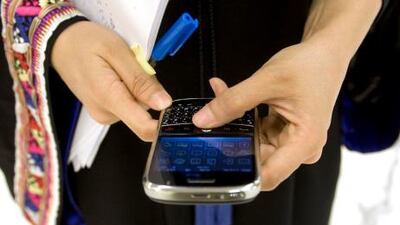BlackBerry has reported a 140 per cent growth in subscribers in the Middle East over the last year, according to the manufacturer of the handset.
Gitex 2011: Gadgets and gizmos galore
Look into the future Read all of The National's coverage of the huge UAE technology show. Learn more
"The Middle East is an enormously important and fast-growing region," said Jim Balsillie, the chief executive of Research in Motion, which makes BlackBerry handsets.
The company says its subscriber base grew by 140 per cent in the year to August 2011.
"We expect to double the size of our business this year," Mr Balsillie said.
Mr Balsillie was addressing the Telecoms Symposium at the Gitex Technology Week in Dubai. The topic of his speech was next-generation telecommunications in the Middle East region.
His appearance comes at a difficult time for RIM.
According to research firm Gartner, BlackBerry's share of the global smartphone market dropped to 12 per cent in the second quarter of this year, compared with 19 per cent the previous year.
Sales of BlackBerry handsets have been hit by greater competition from rival models such as the Apple iPhone and those running on Google's Android platform.
RIM's share price has been in steady decline.
According to research by Bloomberg, senior executives at RIM have refrained from buying the company's shares for the longest period in at least six years.
RIM executives have not reported buying shares on the open market since July 2010, as shares in the company fell by 60 per cent, Bloomberg reported.
The company has also been hit by disappointing sales of the Playbook, its answer to the Apple iPad tablet. The company reported that just 200,000 units shipped in the first full quarter of availability, falling well below expectations.
Mr Balsillie also announced the global launch of a new technology called BlackBerry Tag.
The system will allow smartphone users to share information such as contacts, documents and multimedia simply by tapping their phones together.
RIM is also in talks with Etisalat and MasterCard in the UAE over 'near-field communications' technology, Mr Balsillie said. This could allow for "secure mobile payments".
There are now 16,500 applications live on BlackBerry's Middle East apps store.
Mr Balsillie refused to answer questions about sales of its Playbook tablet in the Middle East.
bflanagan@thenational.ae

